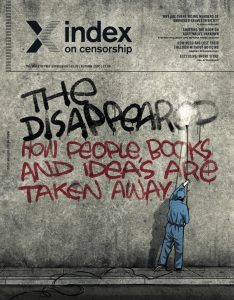28 Nov 2019 | Ukraine, Ukraine Incident Reports
[vc_row][vc_column][vc_column_text]
Index on Censorship’s Monitoring and Advocating for Media Freedom project tracks press freedom violations in five countries: Azerbaijan, Belarus, Russia, Turkey and Ukraine. Learn more.
[/vc_column_text][/vc_column][/vc_row][vc_row][vc_column][vc_row_inner][vc_column_inner][vc_custom_heading text=”9 Incidents” use_theme_fonts=”yes”][/vc_column_inner][/vc_row_inner][vc_column_text]
Online news outlet Bykvu reported pressure from Servant of the People politician
31 October 2019 – The editorial board of Bykvu online news outlet expressed concern at a statement from Servant of the People’s deputy chairman, Alexander Kornienko, who insinuated that parliamentary photojournalists could face lawsuits if they’re not “careful”, Zmina news outlet reported.

Servant of the People
In a statement, Bykvu’s editorial board said that they regard Kornienko’s statement that “parliamentary photojournalists should be more careful” or “it could provoke a response”, as well as his allusion to the Criminal Code and possible lawsuits against photojournalists, as a request for journalists to self-censor. This, they believe, was an attempt to put pressure on independent media.
Bykvu believed that Kornienko’s statement sought to intimidate them for having published screenshots of correspondences between Servant of the People parliamentarian, Bogdan Yaremenko, and a sex worker. The story, which had been published the day before Kornienko made his statement, spread widely in the Ukrainian media.
Link(s): https://bykvu.com/ru/bukvy/obrashhenie-redakcii-internet-izdanija-bukvy-k-prezidentu-ukrainy-i-rukovodstvu-frakcii-partii-sluga-naroda-o-nedopustimosti-davlenija-na-smi/
https://zmina.info/news/vydannya-yake-vykrylo-perepysku-slugy-narodu-z-seks-praczivnyczeyu-zayavylo-pro-tysk-z-boku-yaremenka/
https://lb.ua/news/2019/10/31/441063_yaremenko_isklyuchat_fraktsii_izza.html
https://www.rferl.org/a/ukraine-launches-probe-into-ex-lawmaker-who-threatened-released-data-on-rfe-staff/30257921.html
Categories: Intimidation, Censorship
Source of violation: Government/State Agency/Public official(s)/Political party
Investigative crew’s personal data leaked by former government official
31 October 2019 – Andriy Portnov, former MP and ex-Deputy Head of the Presidential Administration of former President Viktor Yanukovych, published personal information about the driver who works for Schemes, RFE/RL reported.

Andriy Portnov published some of Schemes staff’s personal information on his Telegram channel
Portnov, who has recently risen to prominence and has a significant following on his Telegram channel, posted the personal data of Schemes’ driver, including his passport information, home address, and car number plates.
According to RFE/RL, Schemes had been conducting an investigation into the nature of Portnov’s connections with the new Ukrainian authorities. Schemes’ editorial board told Radio Liberty that it regards the publication of the personal data as an attempt to pressure and influence the Schemes team. According to reports, it said that it considers the investigation into Portnov’s to be in the public interest. The editorial board said that it does not intend to stop the investigation.
According to reports, Lyudmila Pankratova, a lawyer from the Regional Press Development Institute, said that the dissemination of the Schemes’ driver’s information was a threat and is in contravention of Article 6 of the Law on the Protection of Personal Data, which defines the instances in which such personal data may be disseminated.
Updates:
5 November 2019 – In the days after 31 October, Portnov continued to disclose, via his Telegram channel, the registration number plate details of 16 vehicles used by Schemes’ staff. According to RFE/RL, on 5 November he reportedly invited anyone who came across these vehicles to “give a stiff rebuff” to the drivers.
7 November 2019 — Police launched criminal proceedings related to the threats against Schemes’ staff, RFE/RL reported. According to the National Police, criminal proceedings against Portnov were opened under the articles relating to the obstruction of the legitimate professional activity of journalists and threats or violence against journalists.
According to RFE/RL, Portnov responded on his Telegram channel saying that he would file a “symmetrical” police report on RFE/RL for the same offenses. He reportedly says that, since he is an employee of 112 Ukraine television, he should enjoy the same level of journalistic protection as Schemes staff. Portnov’s complaint was reportedly filed with police.
On 5 November Portnov posted on his Telegram channel that he was a special correspondent and presenter of the PortnovNow program on 112 Ukraine TV channel. The ex-official wrote that his editorial assignment from the program was to “inform the audience about people who engage in illegal activities.” This was reportedly interpreted as a reference to Schemes’ journalists.
Link(s): https://www.radiosvoboda.org/a/news-schemes-portnov-dani/30248189.html
https://imi.org.ua/news/portnov-oprylyudnyv-personalni-dani-vodiya-shem-cherez-te-shho-redaktsiya-gotuye-pro-nogo-i30273
https://t.me/PortnovUA/1316
https://www.npu.gov.ua/news/Informacziya/policziya-rozpochala-kriminalne-provadzhennya-za-faktom-pogroz-zhurnalistam-radio-svoboda/
https://www.npu.gov.ua/news/Informacziya/slidchi-naczpolicziji-rozpochali-kriminalne-provadzhennya-za-zayavoyu-advokata-andriya-portnova/
https://imi.org.ua/news/politsiya-vidkryla-spravu-za-zayavoyu-portnova-pro-pereshkodzhannya-zhurnalistamy-shem-i30361
https://t.me/PortnovUA/1339
Categories: DDoS/Hacking/Doxing, Online Defamation/Discredit/Harassment/Verbal Abuse, Intimidation
Source of violation: Known private individual(s)
Female journalist threatened when filming accident scene
27 October 2019 – Olga Dvoynos, a correspondent for UA:Chernihiv TV channel, was threatened by an unknown person while she was filming a scene of a car accident in Chernihiv, Detector Media reported.
While Dvoynos was filming, an unknown man approached her, threatened to break her phone, and stopped her from filming, even after she had shown him her press identification.
According to the chief news editor of UA:Chernihiv, Andriy Titok, the car that crashed allegedly belonged to a company owned by the mayor of Chernihiv, Vladislav Atroshenko. UA:Chernihiv is working on identifying the man, and intends to file a complaint to the police on obstruction of the journalist’s professional activity.
Link(s): https://cn.suspilne.media/news/44423
https://stv.detector.media/reformuvannya/regional_movnyky/zhurnalisttsi_kanalu_ua_chernigiv_pogrozhuvali_rozbiti_telefon_pid_chas_zyomki_na_mistsi_dtp/
Categories: Intimidation
Source of violation: Other/Unknown
Online news outlet editor assaulted by local deputy
23 October 2019 – Victor Goloborodko, online editor for Texts.Alexandriya, was assaulted by Hennady Lotsman, the Head of the Housing, Urban Planning and Architecture Department of Alexandria City Council, the Institute for Mass Information reported.
The journalist was filming a conflict near a landfill, between local residents and employees of a municipal utility that managed the landfill.
Goloborodko told IMI’s representative in Kirovograd Region that he had been called by local residents to report on the situation around the landfill. Employees of the municipal utility that managed the landfill company blocked the entry for residents (who were reportedly outraged by the presence of landfills in the vicinity of their homes). He said that he arrived at the venue around midnight and began filming the incident. Footage of Hennady Lotsman’s car was reportedly in the video. He said that the deputy tried to knock the camera out of his hands and pushed him.
Immediately after the incident, the journalist filed a complaint to the police, reporting an injury to the hand. He reportedly said that he intends to pursue the matter.
Link(s):https://imi.org.ua/news/v-oleksandriyi-deputat-napav-na-mistsevogo-zhurnalista-i30125
Categories: Physical Assault/Injury, Attack to Property
Source of violation: Government/State Agency/Public official(s)/Political party
Separatists sentenced Ukrainian journalist to 15 years in prison
22 October 2019 – Ukrainian journalist and blogger Stanyslav Aseev was sentenced to 15 years in prison by the so-called “Supreme Court” of the self-proclaimed Donetsk People’s Republic, Hromadske reported. He was also deprived of the right to engage in journalistic activities for 2.5 years.
According to online media outlets of Donetsk People’s Republic, Aseev conducted a visual reconnaissance of the locations of the units of the People’s Police of Donetsk People’s Republic, and transmitted the data to representatives of the Security Service of Ukraine. In the case file it is alleged that the blogger has recruited pro-Ukrainian users in social media to collect and transmit military and other information.
The so-called “court” found Aseev guilty of organising an extremist community, espionage and incitement to espionage, public calls for extremist activities, and public calls for actions aimed at violating territorial integrity. Aseev will serve time in a maximum-security jail.
Ukrainian journalist Stanyslav Aseev went missing in the Donbass region on 3 June 2017. That day he was reportedly expected to send material to Radio Free Europe/Radio Liberty, which showed life in the self-proclaimed Donetsk People’s Republic. Aseev has been working under the pen name of Stanyslav Vasin since 2014, and reported from Donetsk for Radio Svoboda, Dzerkalo Tyzhnya, Ukrayinska Pravda and Ukrainian Week.
Link(s): https://hromadske.ua/ru/posts/v-dnr-osudili-plennogo-zhurnalista-aseeva-do-15-let-tyurmy
http://dnr-live.ru/ukrainskiy-zhurnalist-aseev-prigovoren-v-dnr-k-15-godam-kolonii/
Categories: Arrest/Detention/Interrogation, Criminal Charges/Fines/Sentences
Source of violation: Other/Unknown
TV presenter received letter containing death threats
21 October 2019 – Mykhailo Beizerman, political talk show host at the First City TV channel in Odessa, received a letter containing death threats. Beizerman posted the letter on his Facebook page.
The letter said that the representatives of a patriotic organization were gathering information about the journalist and decided that he would be a “showcase victim.” A photograph depicting Beizerman as a shooting target was included in the letter. Beizerman linked the threats to his journalistic activities.
The name of the patriotic organization was not specified in the letter. The police launched an investigation into the threats.
Link(s): https://www.facebook.com/mic.beyzerman/posts/241702263470920
https://www.infoport.live/news/odessa-news/odesskij-zhurnalist-poluchil-neobychnoe-pismo-s-ugrozami/
Categories: Intimidation
Source of violation: Other/Unknown
Court grants investigators access to journalists‘ internal communication
17 October 2017 – Kyiv’s Pechersk District Court granted the State Bureau of Investigations (SBI) permission to temporarily access editorial communication of the journalists of Schemes, an investigative program of Radio Free Europe/Radio Liberty and public broadcaster UA:Pershyi, RFE/RL reported. SBI investigators also were granted access to a range of other in-house editorial data – the work hours of journalists, cameramen and drivers, and data on their salaries. The information is to be provided within a month.
According to the court, if the editorial board does not provide the SBI with the above information, the court, at the request of the investigators of the SBI, “has the right to issue a search permit for the purpose of finding and seizing the items and documents.”
In January 2018, Schemes authors Mykhailo Tkach and Nataliya Sedletska did a story titled “Mr. Petro Incognito: President Poroshenko’s Secret Vacation”. They found proof that Ukraine’s ex-president went on a secret vacation to the Maldives that cost around $500,000, and suggested that he used a fake passport and avoided customs. A police investigation was launched on 6 August, which includes charges such as an alleged “unlawful transfer of persons” – in particular, Poroshenko – across Ukrainian state border “using knowingly forged documents.”
The list of data that the journalists are required to submit to the SBI, includes all the footage they took, information requests and responses during the preparation of the investigation, any documents confirming the presence of involved journalists and other staff during the filming.
Schemes editorial board published an official statement, saying that documents requested by the ruling was “excessive”, and expressed concern that providing them would compromise their sources. They noted that Schemes had provided all the documents that had previously been requested.
Kyiv’s Pechersk District Court decision cannot be appealed. Schemes are consulting lawyers to establish the best course of action.
Link(s): https://www.radiosvoboda.org/a/news-schemes-sud-dbr-dostup/30232159.html
https://www.radiosvoboda.org/a/schemes/30232185.html
https://www.golos-ameriki.ru/a/court-in-kiev-granted-access-to-the-correspondence-of-journalists/5137310.html
Categories: Subpoena / Court Order/ Lawsuits
Source of violation: Government/State Agency/Public official(s)/Political party
TV crew blocked by unidentified persons
15 October 2019 – Avers TV channel’s crew was blocked by unidentified persons near Volodymyr-Volyn poultry factory in the Volyn region, the Institute for Mass Information reported.
The journalists were reportedly filming a report about the poultry factory’s open-air warehouses (used to hold waste) and the pollution they produced. During filming, two cars of unknown men arrived at the scene and blocked the TV crew’s car.
Avers TV journalist Natalia Polishchuk reported that the unidentified men refused to identify themselves. Polishchuk said that the men prevented them from filming, saying that it was private property. She reportedly said that because their vehicle was blocked, they locked themselves into the car as a means of protection. She said that the men did not react to their signals to clear their path. From the car, they called the police who arrived within 40 minutes. The journalists filed a complaint to the police regarding the incident.
According to IMI, the police are investigating the case and deciding whether to open criminal proceedings under the article “impeding the legitimate professional activity of journalists.”
Link(s): https://www.youtube.com/watch?v=_Jv0Ncfz5lc
https://imi.org.ua/news/zhurnalistiv-aversu-zablokuvaly-pid-chas-zjomok-vidstijnykiv-volodymyr-volynskoyi-ptahofabryky-i30029
Categories: Blocked Access
Source of violation: Unknown
National Council requested court to revoke TV channel’s license
2 October 2019 – The National Council on Television and Radio Broadcasting has requested that the District Administrative Court of Kyiv revoke the broadcasting license issued to the LLC Novyny 24 hours (which uses the NewsOne logo), the Institute for Mass Information reported. The court is currently deciding whether to institute proceedings in this administrative case.
On 5 September, the National Council for Television and Radio Broadcasting sued the NewsOne TV channel due to what they said was the systematic incitement of hostility.
NewsOne claimed that it considered National Council’s decision to sue them as part of a crackdown on freedom of speech in Ukraine and an attempt to oust all independent media from the Ukrainian media landscape.
In August, National Council member Serhiy Kostinsky said that the National Council for Television and Radio Broadcasting would ask the judges to revoke the license of NewsOne TV channel.
Link(s): https://imi.org.ua/news/natsrada-podala-pozov-do-sudu-z-prohannyam-anulyuvaty-litsenziyu-newsone-i29856
http://oask.gov.ua/node/4119?fbclid=IwAR3ckT3Qe51dd4wf0pT9sDgnUDqV-llkkIWtjJmXeQhRCGpLnjieKkL25Ao
https://112.international/ukraine-top-news/international-editorial-council-demands-ukrainian-authorities-to-prevent-newsone-tv-channel-license-cancellation-43012.html
Categories: Legal Measures
Source of violation: Government/State Agency/Public official(s)/Political party[/vc_column_text][/vc_column][/vc_row][vc_row][vc_column][vc_basic_grid post_type=”post” max_items=”4″ element_width=”6″ grid_id=”vc_gid:1574858033039-46c1676b-ec83-1″ taxonomies=”8996″][/vc_column][/vc_row]
10 Sep 2018 | Magazine, News, Volume 47.03 Autumn 2018
[vc_row][vc_column][vc_custom_heading text=”Using fiction and stories to influence society is nothing new, but facts are needed to drive the most powerful campaigns, argues Rachael Jolley in the autumn 2018 Index on Censorship magazine” google_fonts=”font_family:Libre%20Baskerville%3Aregular%2Citalic%2C700|font_style:400%20italic%3A400%3Aitalic”][vc_column_text]

Poster for the 1948 film adaptation of Charles Dickens Oliver Twist (Photo: Ethan Edwards/Flickr)
My friend’s dad just doesn’t believe that UK unemployment levels are incredibly low. He thinks the country is in a terrible state. So when I sit down and say unemployment in 2018 is at 4.2%, the joint lowest level since 1971, he doesn’t really argue. Because he doesn’t believe it.
Well, I say, these are the official figures from the Office for National Statistics. His response is: “Hmm.” Clearly my interjection hasn’t made any difference at all.
He raises an eyebrow to signify, “They would say that, wouldn’t they?”.
This figure, and the picture it sketches, doesn’t chime with his national view, which is that things are very, very bad. And it doesn’t chime with the picture sketched in the newspaper that he reads every day, which is that things are very, very bad.
So, consequently, whatever facts or figures or sources you might throw at him to prove otherwise, nothing makes an impression on him. He believes that the world is the way he believes it is. No question.
Like many people, my friend’s dad reads news stories that reflect what he believes already, and discards stories or announcements that don’t.
And in itself, that is nothing new. For decades people have trusted their neighbours more than people far away. They have read a newspaper that echoed their political persuasion, and sometimes they have felt that the society they lived in was worse than it used to be, even when all the indicators showed their lives had improved.
Often humans believe in ideas by instinct, not because they are presented with a graph. In 2005, Drew Westen, a professor of psychology and psychiatry at Emory University, in Atlanta, USA, published The Political Brain. In it, he argued that the public often made decisions to support political parties based on emotions, not data or fact.
The book struck home with activists, who tried to utilise Westen’s thinking by changing the way they campaigned. Politicians had to capture the public’s hearts and minds, Westen said. He talked about the role of emotion in deciding the fate of a nation and gave examples. When US President Lyndon Johnson proposed the 1965 Voting Rights Act, which outlawed racial discrimination at the US ballot box, he used personal stories to make his points stronger, said Westen, adding that this was a powerful tool. In doing so, Westen was ahead of his time in acknowledging just how strongly humans value emotion, and how an emotional action can be driven by feeling and desire rather than the latest data from a governmental body.
[/vc_column_text][/vc_column][/vc_row][vc_row][vc_column width=”1/4″][vc_icon icon_fontawesome=”fa fa-quote-left” color=”custom” align=”right” custom_color=”#dd3333″][/vc_column][vc_column width=”3/4″][vc_custom_heading text=”The articulation of ideas through emotional stories, though, is really no different from Charles Dickens sketching the harsh world of the children in workhouses in Oliver Twist” google_fonts=”font_family:Libre%20Baskerville%3Aregular%2Citalic%2C700|font_style:400%20italic%3A400%3Aitalic”][/vc_column][/vc_row][vc_row][vc_column][vc_column_text]
Westen used his thesis to show why he felt US Democratic candidates Al Gore and Michael Dukakis had failed to get elected, and why George W Bush had. Bush, he felt, was in touch with his emotional side while Dukakis and Gore tended to turn to dry data and detail.
That argument about how emotional beliefs or gut feelings are being used to influence important decisions has raced up the agenda since President Donald Trump arrived in the White House, the UK voted for Brexit and with the use of emotionally driven political campaigns to shift public opinion in Hungary and Poland.
Suddenly this question of why people were responding to appeals to emotion and dismissing facts was the debate of the moment. In many ways this is nothing new but the methods of receiving ideas and information are different. Now we have Facebook and Instagram posts, and zillions of tweets to spin and challenge.
One part of it, the articulation of ideas through emotional stories, though, is really no different from Charles Dickens sketching the harsh world of the children in workhouses in Oliver Twist, or Victorian writer Charles Kingsley’s story The Water Babies. Kingsley’s tale of child chimney sweeps helped to introduce the 1864 Chimney Sweepers Regulation Act, which improved the lives of those children significantly.
Fictional stories, like these, have always played a part in changing attitudes, but also draw on reality. Dickens and Kingsley were outraged by the living and working conditions they saw, so they chose to try to effect change by using fictional stories to engage a wider public. And personal stories are also used to illuminate wider factual trends. For years journalists have used a case study as an explainer for something more detailed.
Facts and figures undoubtedly must have a role. Even when it appears there is public resistance to acceptance of data, something such as the fact that if you wear a seatbelt when driving a car you will have a better chance of surviving an accident becomes an accepted truth over time. Public information and published statistics clearly play a part in that shift.
That’s why it is so vital that public access to information is protected and that incorrect facts are challenged. This month, 28 September is the international day for universal access to information, something that concentrates the mind when you look at places where access is limited, or where government data is skewed to such a level that it becomes almost pointless.
Journalists reporting in countries including Belarus and the Maldives tell us their quest for trustworthy sources of national information are almost impossible to find as their governments refuse to respond to media requests or release untrue information. Officials also use smear tactics to undermine reporters’ reputations, so their accurate journalism is not believed. Governments know that by keeping information from the media they hamper a journalist’s ability to report, and in doing so may keep a scandal from the public. If facts and data didn’t make a difference, those governments would have no reason to restrict access.
Freedom to access information goes hand in hand with freedom of the media and academic freedom in creating an open democratic society. But at Index, we constantly see signs of governments, and others, trying to prevent both access to facts and to suppress writing about inconvenient truths.
In this issue of the magazine, we explore all aspects of this struggle to balance facts and emotion, the quest to find the truth, how we are influenced, and why arguments, debates and discussions are so vital.
There’s lots to read, from Julian Baggini’s piece (p24) on why people might fear a disagreement to tips on how to have an argument from Timandra Harkness (p31). Then there’s Martin Rowson’s Stripsearch cartoon (p26). Our interview with British TV presenter Evan Davis discusses whether lies tend to be found out over time, and the likelihood that people will select facts that support their political position.
What’s it like to be a scientist in the USA right now? Michael Halpern from the Union of Concerned Scientists in the USA says scientists are suddenly getting active to push back against a political climate attempting to take the factfile away from important government departments.
Almost every day a new story pops up outlining another attack on media freedom in Tanzania, and in this issue Amanda Leigh Lichtenstein reveals how bloggers are being priced out of the country (p70) as the government uses new fees to close down independent voices.
Then there’s Nobel prize winner Herta Müller on her experiences of censorship as a writer living in communist Romania (p67), and Nazanin Zaghari-Ratcliffe’s poems written in prison (p86).
And finally, look out for our Banned Books Week events coming up at the end of September – find out more on the website. You’ll also find the magazine podcast, with interviews with broadcaster Claire Fox and Tanzanian blogger Elsie Eyakuze, on Soundcloud, and watch out for your invitation to the upcoming magazine event at the Royal Institution in October.
[/vc_column_text][/vc_column][/vc_row][vc_row][vc_column][vc_column_text]
Rachael Jolley is editor of Index on Censorship. She tweets @londoninsider. This article is part of the latest edition of Index on Censorship magazine, with its special report on The Age Of Unreason.
Index on Censorship’s autumn 2018 issue, The Age Of Unreason, asks are facts under attack? Can you still have a debate? We explore these questions in the issue, with science to back it up.
Look out for the new edition in bookshops, and don’t miss our Index on Censorship podcast, with special guests, on Soundcloud.
[/vc_column_text][/vc_column][/vc_row][vc_row content_placement=”top”][vc_column width=”1/3″][vc_custom_heading text=”The Age Of Unreason” font_container=”tag:p|font_size:24|text_align:left” link=”url:https%3A%2F%2Fwww.indexoncensorship.org%2F2018%2F09%2Fage-of-unreason%2F|||”][vc_column_text]The autumn 2018 issue of Index on Censorship magazine explores the age of unreason. Are facts under attack? Can you still have a debate? We explore these questions in the issue, with science to back it up.
With: Timandra Harkness, Ian Rankin, Sheng Keyi[/vc_column_text][/vc_column][vc_column width=”1/3″][vc_single_image image=”102479″ img_size=”medium” alignment=”center” onclick=”custom_link” link=”https://www.indexoncensorship.org/2018/09/age-of-unreason/”][/vc_column][vc_column width=”1/3″ css=”.vc_custom_1481888488328{padding-bottom: 50px !important;}”][vc_custom_heading text=”Subscribe” font_container=”tag:p|font_size:24|text_align:left” link=”url:https%3A%2F%2Fwww.indexoncensorship.org%2Fsubscribe%2F|||”][vc_column_text]In print, online. In your mailbox, on your iPad.
Subscription options from £18 or just £1.49 in the App Store for a digital issue.
Every subscriber helps support Index on Censorship’s projects around the world.
 SUBSCRIBE NOW[/vc_column_text][/vc_column][/vc_row]
SUBSCRIBE NOW[/vc_column_text][/vc_column][/vc_row]
 Ruth Bader Ginsburg is a dissenting voice. Throughout her career she has not been afraid to push back against the power of the crowd when very few were ready for her to do so.
Ruth Bader Ginsburg is a dissenting voice. Throughout her career she has not been afraid to push back against the power of the crowd when very few were ready for her to do so.![]() SUBSCRIBE NOW[/vc_column_text][/vc_column][/vc_row][vc_row][vc_column][/vc_column][/vc_row]
SUBSCRIBE NOW[/vc_column_text][/vc_column][/vc_row][vc_row][vc_column][/vc_column][/vc_row]


